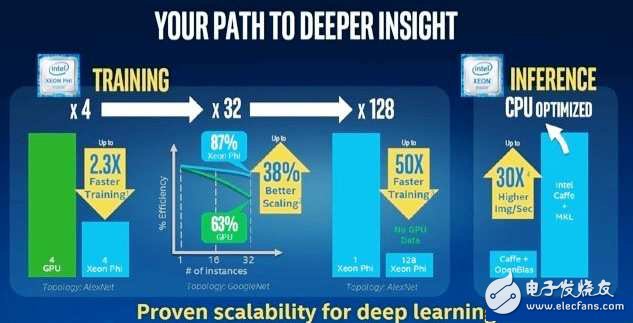BMW and Intel and Mobileye announced that they have joined forces to establish an industry-standard open platform for autonomous vehicles. It is expected that autopilots will be available in 2021...
Automakers BMW and Intel and Mobileye have jointly announced that they will jointly establish an industry-standard open platform for autonomous vehicles. It is expected to be able to drive fully-automobile vehicles in 2021; BMW and Mobileye Cooperation is well known, and Intel has also come to the forefront, which has surprised many industry observers.
It is unclear whether the BMW, Mobileye, and Intel tripartite cooperation plans will spawn "Intel inside" autonomous vehicles. If this is really the case, market analysts question whether Mobileye, which has always been strict in protecting its own algorithms, will I am happy to share my intellectual property with anyone, let alone Intel.
However, with the topic of self-driving vehicles being sizzled and the CEOs of various car manufacturers failing to hide the relevant issues at the financial report conference, it is not surprising that the technology industry has rushed into this field. For the above cooperation information, EE TImes editorial inquiry Several questions from market analysts:
Mobileye's competitors -- including NXP, Nvidia, Qualcomm, etc. -- should be nervous?
Is Mobileye's current partners, including Volkswagen, GM (General Motors) and Tesla Motors, dissatisfied?
Or, should everyone calmly look at this matter and take it easy?
Egil Juliussen, market analyst for automotive communications entertainment and advanced driver assistance systems (ADAS) at IHS AutomoTIve, believes that this latest tripartite partnership is well developed because autonomous vehicles are not easy to develop and require a combination of many different technologies- ─ Including deep learning, sensor fusion...etc., can really replace human driving; therefore, from a higher level: “This type of cooperation will allow related technologies to further develop and speed up.â€
BMW, Mobileye and Intel are expected to make great strides in the field of autonomous vehicles. Many other automakers are also actively rushing in, but in fact, smaller players may not have such deep pockets to achieve their goals; in addition, Juliussen pointed out that Google is also a Factors, the automotive industry is hard to ignore the autonomous vehicle technology is considered to lead many of the industry in Google.
While Mobileye's competitors may be paying attention to this cooperation case, Juliussen said that autopilot vehicles are still in the pre-compeTITIve stage, considering the complexity of autopilot vehicle testing and certification standards, industry. It should benefit from a standardized, self-driving vehicle platform that avoids duplication of development resources.
Juliussen cited the GENIVI Alliance, a non-profit automotive industry alliance (initiated by Intel, BMW, GM...and many others), which successfully promoted the open source software development project: "But automakers (and chip suppliers), The implementation level can still compete with each other."
However, whether the cooperation between BMW, Mobileye and Intel can successfully define a standardized autonomous vehicle platform is hard to say.
Jeremy Carlson, another senior analyst at IHS Automotive, pointed out that he noticed that at least two other manufacturers mentioned the central computing architecture of autonomous vehicles. One was the zFAS (integrated with Nvidia and Mobileye chips) and the Mercedes-Benz from Audi and Delphi. Another auto-driving vehicle platform is also being developed with a first-line automotive electronics industry.
Intel's Xeon Phi chip
Carlson was amazed at Intel's participation in the partnership between BMW and Mobileye; he said that we can of course think of a platform that is simple, Intel processors can work with the Mobileye processor in a "computer" in an autonomous vehicle, but In view of the lack of information disclosed in this cooperation case: "We still don't know if this is the case."
The partnership statement between BMW, Mobileye and Intel did not mention the role that Intel will play, only in general terms: "Intel brings comprehensive technology, launching and connecting billions of smart networking devices, including cars."
A more convincing argument is that Intel's role will be in the infrastructure, not in the self-driving vehicle; Luca De Ambroggi, chief analyst of IHS Technology's automotive semiconductor market, speculates that Intel may provide and be responsible for autonomous driving. Part of the vehicle connectivity technology, as well as the connection between vehicles and the cloud, the Internet of Things (IoT), and the data processing required for maps and artificial intelligence (AI) applications, contributing to infrastructure expertise.
De Ambroggi mentioned Intel's recent generation of Xeon Phi processor codenamed Kinghts Landing at the International Supercomputing Conference in Germany; the 1.5GHz Xeon Phi is equipped with 72 cores and built-in 16GB integrated stack memory Body, has been stationed in many super computers.
Intel has so far been relatively low-key in deep learning applications, but the company clearly expects a new generation of Xeon Phi to enter the fast-growing market that is currently dominated by Nvidia; Intel also shared four Xeon Phi to complete Caffe Alexnet imaging The neural network reached the training result of processing 1.33 billion images in 10.5 hours, and it took 25 hours for Maxwell's four graphics processors to achieve the same result.

Performance of Intel's next-generation Xeon Phi processor in deep learning (Source: Intel)
Mike Demler, senior analyst at The Linley Group, agrees. He believes that in the tripartite cooperation between BMW, Mobileye and Intel, Intel's focus is on development systems (such as Nvidia's Digits workstations) and data centers.
"Mobileye is very cautious in co-presenting the statement that its algorithm will be deployed on the EyeQ processor, and the algorithms on the Intel platform will need to be developed together;" Demler also pointed out that Mobilieye's Road Experience Management (REM) Technology needs to be connected to the cloud instantly, Intel should be expected to play in this part.
(To be continued...)
Compilation: Judith Cheng
(Reference: Why Intel Got Inside BMW-Mobileye Deal, by Junko Yoshida)
Aluminum Alloy LED lamps,Low Power LED lamps,LED wall washer
Kindwin Technology (H.K.) Limited , https://www.ktl-led.com